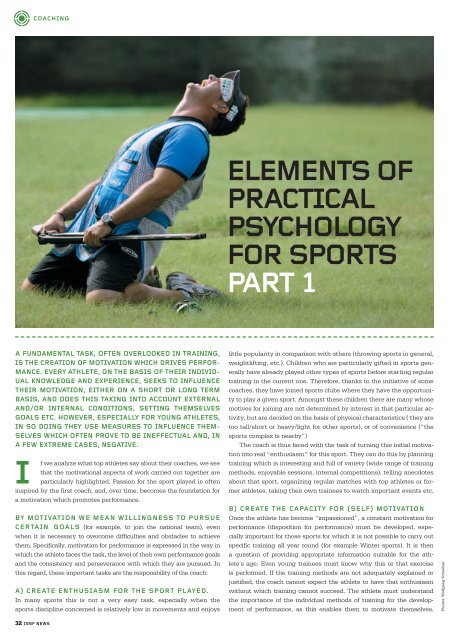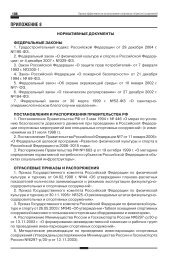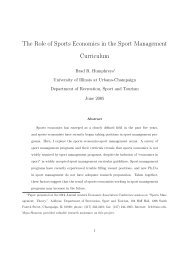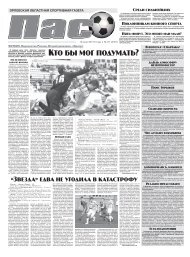Create successful ePaper yourself
Turn your PDF publications into a flip-book with our unique Google optimized e-Paper software.
A FUNDAMENTAL TASK, <strong>OF</strong>TEN OVERLOOKED IN TRAINING,<br />
IS <strong>ThE</strong> CREATION <strong>OF</strong> MOTIVATION WhICh DRIVES PERFOR-<br />
MANCE. EVERY AThLETE, ON <strong>ThE</strong> BASIS <strong>OF</strong> <strong>ThE</strong>IR INDIVID-<br />
UAL KNOWLEDGE AND EXPERIENCE, SEEKS TO INFLUENCE<br />
<strong>ThE</strong>IR MOTIVATION, EI<strong>ThE</strong>R ON A ShORT OR LONG TERM<br />
BASIS, AND DOES ThIS TAKING INTO ACCOUNT EXTERNAL<br />
AND/OR INTERNAL CONDITIONS, SETTING <strong>ThE</strong>MSELVES<br />
GOALS ETC. hOWEVER, ESPECIALLY FOR YOUNG AThLETES,<br />
IN SO DOING <strong>ThE</strong>Y USE MEASURES TO INFLUENCE <strong>ThE</strong>M-<br />
SELVES WhICh <strong>OF</strong>TEN PROVE TO BE INEFFECTUAL AND, IN<br />
A FEW EXTREME CASES, NEGATIVE.<br />
I<br />
f we analyze what top athletes say about their coaches, we see<br />
that the motivational aspects of work carried out together are<br />
particularly highlighted. Passion for the sport played is often<br />
inspired by the first coach, and, over time, becomes the foundation for<br />
a motivation which promotes performance.<br />
BY MOTIVATION WE MEAN WILLINGNESS TO PURSUE<br />
CERTAIN GOALS (for example, to join the national team), even<br />
when it is necessary to overcome difficulties and obstacles to achieve<br />
them. Specifically, motivation for performance is expressed in the way in<br />
which the athlete faces the task, the level of their own performance goals<br />
and the consistency and perseverance with which they are pursued. In<br />
this regard, these important tasks are the responsbility of the coach:<br />
A) CREATE ENThUSIASM FOR <strong>ThE</strong> SPORT PLAYED.<br />
In many sports this is not a very easy task, especially when the<br />
sports discipline concerned is relatively low in movements and enjoys<br />
32 ISSF NEWS<br />
COAChING<br />
ELEMENTS <strong>OF</strong><br />
PRACTICAL<br />
PSYChOLOGY<br />
FOR SPORTS<br />
PART 1<br />
little popularity in comparison with others (throwing sports in general,<br />
weightlifting, etc.). Children who are particularly gifted in sports generally<br />
have already played other types of sports before starting regular<br />
training in the current one. Therefore, thanks to the initiative of some<br />
coaches, they have joined sports clubs where they have the opportunity<br />
to play a given sport. Amongst these children there are many whose<br />
motives for joining are not determined by interest in that particular activity,<br />
but are decided on the basis of physical characteristics ( they are<br />
too tall/short or heavy/light for other sports), or of convenience (“the<br />
sports complex is nearby”)<br />
The coach is thus faced with the task of turning this initial motivation<br />
into real “enthusiasm” for this sport. They can do this by planning<br />
training which is interesting and full of variety (wide range of training<br />
methods, enjoyable sessions, internal competitions), telling anecdotes<br />
about that sport, organizing regular matches with top athletes or former<br />
athletes, taking their own trainees to watch important events etc.<br />
B) CREATE <strong>ThE</strong> CAPACITY FOR (SELF) MOTIVATION<br />
Once the athlete has become “impassioned”, a constant motivation for<br />
performance (disposition for performance) must be developed, especially<br />
important for those sports for which it is not possible to carry out<br />
specific training all year round (for example Winter sports). It is then<br />
a question of providing appropriate information suitable for the athlete’s<br />
age. Even young trainees must know why this or that exercise<br />
is performed. If the training methods are not adequately explained or<br />
justified, the coach cannot expect the athlete to have that enthusiasm<br />
without which training cannot succeed. The athlete must understand<br />
the importance of the individual methods of training for the development<br />
of performance, as this enables them to motivate themselves.<br />
Photos: Wolfgang Schreiber
















